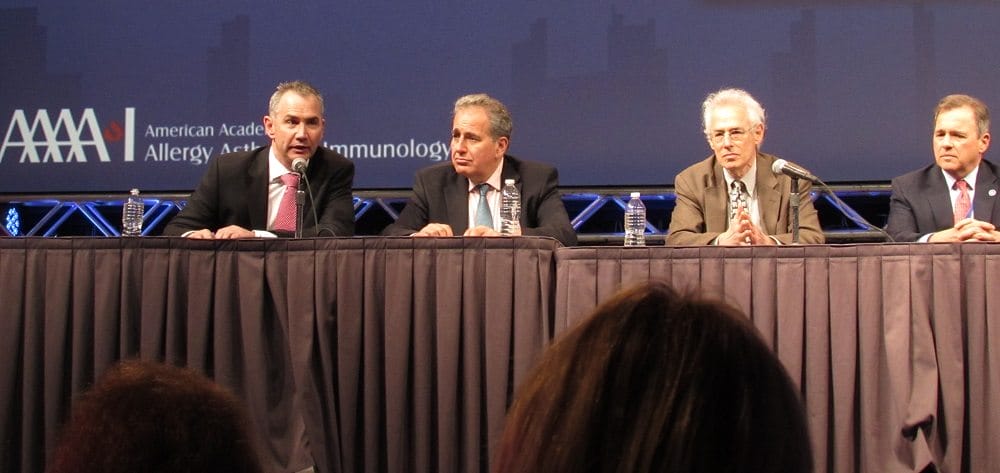The release of the LEAP study’s findings that having at-risk infants consume peanut protein can, in a majority of cases, teach the immune system tolerance and prevent allergy has led to some confusion. In light of questions that have followed the AAAAI meeting announcement of these results, we turned to the experts to address two common areas of concern.
 Authors Dr. George Du Toit and Dr. Gideon Lack with NIAID's Dr. Daniel Rotrosen and FARE's Dr. James Baker.
Authors Dr. George Du Toit and Dr. Gideon Lack with NIAID's Dr. Daniel Rotrosen and FARE's Dr. James Baker. Children who were already considered quite sensitive to peanut were not included in the study. Why wouldn’t a peanut allergy prevention study include those at the most risk?
“These participants were excluded as the trial was designed to investigate the prevention of peanut allergy – and not the treatment of peanut allergy,” lead study author Dr. George Du Toit told Allergic Living. He said there are data “that suggest that infants with skin-prick tests greater than 4 mm are likely peanut allergic.”
FARE CEO Dr. James R. Baker added that: “Children who were already considered to be allergic to peanuts because of the results of their skin tests during screening had to excluded because they could experience serious allergic reactions if they were enrolled in the study. This study helps provide answers about whether feeding a food to a child considered ‘at risk’ for food allergy can prevent them from developing a food allergy.”
The National Peanut Board was one of the groups funding the study, isn’t that a conflict?
“It’s not unusual for industry to fund scientific research,” says FARE’s Baker, who is an allergist.
“In this case, the National Peanut Board was a minority funder and was contractually prohibited from influencing the design or results, so there was no conflict. The LEAP study results were published in a peer-reviewed journal (The New England Journal of Medicine) – meaning that before publication, the article was reviewed by impartial experts in the field.”
The study was supported by grants from the National Institute of Allergy and Infectious Diseases (NIAID), FARE (Food Allergy Research & Education), Medical Research Council and Asthma UK, the National Institute for Health Research (NIH), King’s College Hospital NHS Foundation Trust, the National Peanut Board and the United Kingdom Food Standards Agency. The funding sources, including the National Peanut Board, are disclosed in the study (page 812).
For more on the LEAP study:





